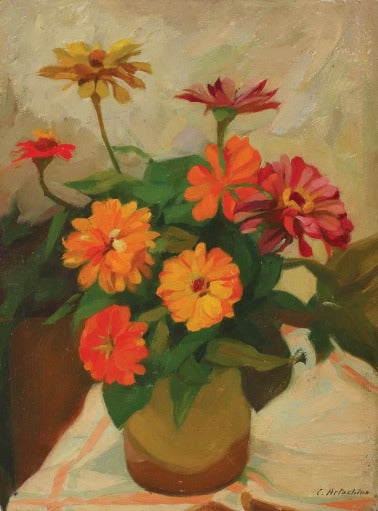Description
The work "Margaritas" (Margarets) by Constantin Artachino, a prominent 19th -century painter, captures the essence of an ephemeral moment through its delicate representation of an intricate bouquet of flowers. Artachino, known for his style that combines naturalism with a touch of impressionism, achieves in this piece the creation of a surround atmosphere that transports the viewer to an almost dreamlike space where nature is the undisputed protagonist.
On the visual plane, the composition of the work focuses on an exuberant deployment of margaritas, whose peculiar characteristics evoke a feeling of freshness and vivacity. This bouquet, arranged in such a way that it almost seems to bloom towards the viewer, is found in a vase that, although simple, complements the richness of the flowers. The choice of a neutral and soft background allows the margaritas to stand out with all their splendor, showing not only the technical ability of Artachino, but also their understanding of how colors can interact to create a visual dialogue.
The treatment of color in "Margaritas" is one of the most notable aspects of the work. Artachino uses a vibrant palette that covers from the pure white of the flowers to golden yellow tones, fresh green and subtle brown nuances in the leaves and the vase. Through subtle wakes and layers of painting, the artist transmits a luminescence that seems to capture the light of day, causing flowers to almost seem to come alive. The quality of the light in the work reminds that of the impressionist landscapers, who also sought to represent the transience of the luminous moments of nature.
As for the technique, Artachino achieves a balance between the meticulous detail and a more loose execution in the funds and in the texture of the flowers. This approach is characteristic of the academic style of the time, where the precision in the representation of nature was combined with a more free way to treat color and light. The use of loose brushstrokes suggests movement and a kind of vitality, causing in the viewer an emotional response that goes beyond mere observation.
Although "Margaritas" is a study of flowers, its historical context offers a look at the symbolism of floral art in the nineteenth century. During this period, flowers were often seen as symbols of feelings and moods, which gave them a deeper meaning in the pictorial narrative. The choice of margaritas in particular can be interpreted as a symbol of innocence and purity, thus offering an additional layer of introspection to the observer.
In conclusion, "Margaritas" of Constantin Artachino is not only a faithful representation of natural beauty, but also a work that invites the viewer to contemplate the delicacy and transience of life. Artachino's mastery in the use of color, light and composition is intertwined to create a visual space that is both introspective and celebratory, solidifying its place within the canon of floral art. Through this work, the viewer is transported to a world where margaritas are not mere flowers, but protagonists of a story full of meaning.
KUADROS ©, a famous paint on your wall.
Hand-made oil painting reproductions, with the quality of professional artists and the distinctive seal of KUADROS ©.
Art reproduction service with satisfaction guarantee. If you are not completely satisfied with the replica of your painting, we refund your money 100%.

